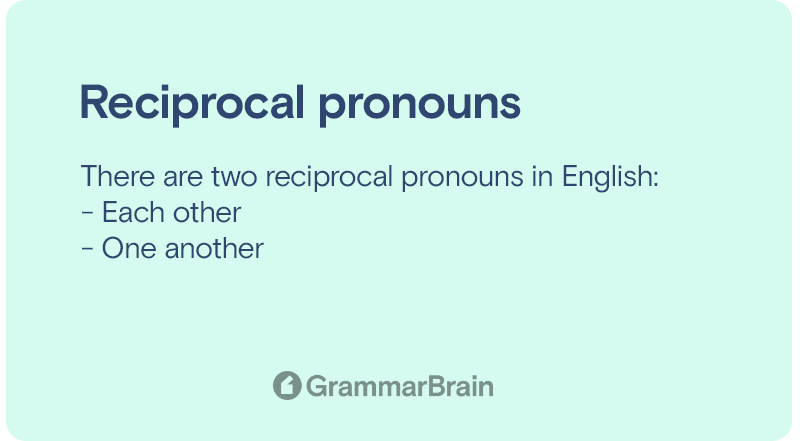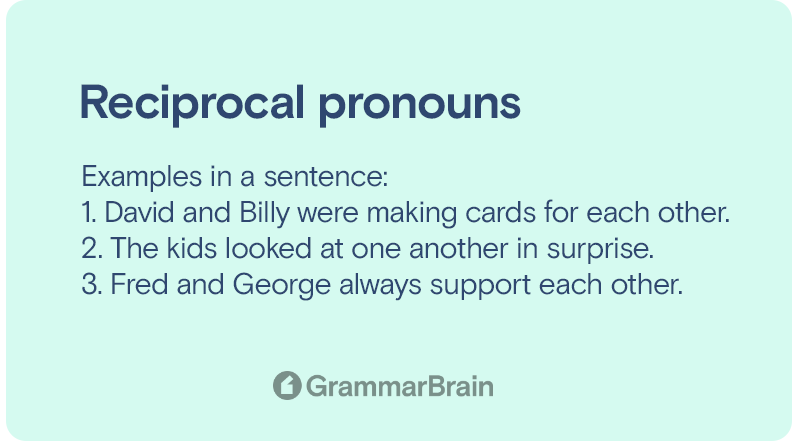What are reciprocal pronouns? How do they work? Are they common in the English language? There are different types of pronouns in the English language. These are used depending on the sentences and context. One such type that we will discuss here is the reciprocal pronoun.

What is a reciprocal pronoun?
A pronoun that implies a reciprocal relationship is referred to as a reciprocal pronoun. A reciprocal pronoun is when someone or anything does something for another person or thing.
It then has the same thing done to them in return. We are referring to a circumstance that is described by reciprocal pronouns.
Take, for instance, the following grammatical construction as an illustration:
- James and Bill gave gifts to each other.
This indicates that James presented Bill with a gift, and Bill presented James with a gift in return.
There are just two reciprocal pronouns available in the English language, and they are “each other” and “one another.”
They come in especially handy in situations to explain the same overarching concept more than once.
Utilizing reciprocal pronouns is a simple process. “each other” is the term that is often utilized when referring to a pair of individuals.
However, “one another” is the term that is typically utilized when referring to a group of more than two people—for example, employees working in a factory.

Here are some instances of pronouns to be used reciprocally:
1. David and Billy were making cards for each other.
2. The kids looked at one another in surprise.
3. Fred and George always support each other.
4. All the students at Hogwarts supported one another.
5. Hermione and Ron were not able to hear each other.
What is the key distinction between the phrases “one another” and “each other”?
When there are two options, choose the one that complements the other. If there is more than one, use them interchangeably.
Use “each other” in situations when there are only two items that are the antecedent of a reciprocal pronoun.
Take, for instance:
- James and Sarah adore each other.
And use “one another” when the antecedent of a reciprocal pronoun is more than two items.
Take, for instance:
- James, Bill, and Sarah are always there to support one another.
How to properly utilize reciprocal pronouns?
There is one key distinction between reciprocal pronouns and other types of pronouns, and it is vital to be aware of this distinction.
In contrast to most other types of pronouns, reciprocal pronouns are the only ones that normally make grammatical sense when they are employed in an object-related context.
Because of this, a reciprocal pronoun is not often used as the subject of a sentence, clause, or phrase in standard English usage.
Correct sentence
- James and Sarah are in a relationship. They love each other.
Incorrect sentence
- James and Sarah are in a relationship. Each other love them.
Additionally, it is essential to be aware that the meanings of reciprocal pronouns and reflexive pronouns are distinct from one another.
Because doing so would cause the phrase’s meaning to shift, these two categories of pronouns are typically incompatible with one another when employed in a sentence.
Take, for instance:
Reciprocal pronoun
- James and Sarah loved each other.
This sentence means that James loved Sarah and Sarah loved James.
Reflexive pronoun
- Sarah and James loved themselves.
This sentence means that Sarah loves herself and James loves himself.
Both “each other” and “one another” can function as possessive terms in the following contexts:
- James and Sarah looked after each other’s families.
- All the students agreed to support one another.
FAQs
1. What is the definition of the reciprocal pronoun?
Words that are utilized in order to demonstrate a mutual relationship between two subjects or objects are referred to as reciprocal pronouns.
2. Which two pronouns are considered to be reciprocal?
There are only two pronouns in the English language that may be used interchangeably: they and them.
The only two reciprocal pronouns are:
1. Each other
2. One another
3. When do we use reciprocal pronouns?
This is a key difference between reflexive and reciprocal pronouns. We use reciprocal pronouns when each of the two or more subjects is acting the same way.
Sources
- What Is A Reciprocal Pronoun? Definition And Examples
- Reciprocal Pronouns
- Reciprocal Pronouns
- What Are Reciprocal Pronouns? (with Examples)
- What Are Reciprocal Pronouns?
Inside this article
Fact checked:
Content is rigorously reviewed by a team of qualified and experienced fact checkers. Fact checkers review articles for factual accuracy, relevance, and timeliness. Learn more.
Core lessons
Glossary
- Abstract Noun
- Accusative Case
- Anecdote
- Antonym
- Active Sentence
- Adverb
- Adjective
- Allegory
- Alliteration
- Adjective Clause
- Adjective Phrase
- Ampersand
- Anastrophe
- Adverbial Clause
- Appositive Phrase
- Clause
- Compound Adjective
- Complex Sentence
- Compound Words
- Compound Predicate
- Common Noun
- Comparative Adjective
- Comparative and Superlative
- Compound Noun
- Compound Subject
- Compound Sentence
- Copular Verb
- Collective Noun
- Colloquialism
- Conciseness
- Consonance
- Conditional
- Concrete Noun
- Conjunction
- Conjugation
- Conditional Sentence
- Comma Splice
- Correlative Conjunction
- Coordinating Conjunction
- Coordinate Adjective
- Cumulative Adjective
- Dative Case
- Determiner
- Declarative Sentence
- Declarative Statement
- Direct Object Pronoun
- Direct Object
- Diction
- Diphthong
- Dangling Modifier
- Demonstrative Pronoun
- Demonstrative Adjective
- Direct Characterization
- Definite Article
- Doublespeak
- False Dilemma Fallacy
- Future Perfect Progressive
- Future Simple
- Future Perfect Continuous
- Future Perfect
- First Conditional
- Irregular Adjective
- Irregular Verb
- Imperative Sentence
- Indefinite Article
- Intransitive Verb
- Introductory Phrase
- Indefinite Pronoun
- Indirect Characterization
- Interrogative Sentence
- Intensive Pronoun
- Inanimate Object
- Indefinite Tense
- Infinitive Phrase
- Interjection
- Intensifier
- Infinitive
- Indicative Mood
- Participle
- Parallelism
- Prepositional Phrase
- Past Simple Tense
- Past Continuous Tense
- Past Perfect Tense
- Past Progressive Tense
- Present Simple Tense
- Present Perfect Tense
- Personal Pronoun
- Personification
- Persuasive Writing
- Parallel Structure
- Phrasal Verb
- Predicate Adjective
- Predicate Nominative
- Phonetic Language
- Plural Noun
- Punctuation
- Punctuation Marks
- Preposition
- Preposition of Place
- Parts of Speech
- Possessive Adjective
- Possessive Determiner
- Possessive Case
- Possessive Noun
- Proper Adjective
- Proper Noun
- Present Participle
- Prefix
- Predicate



